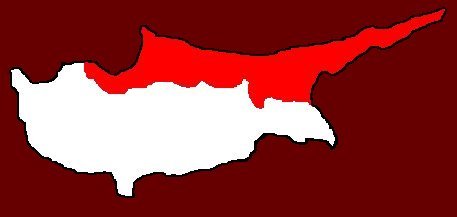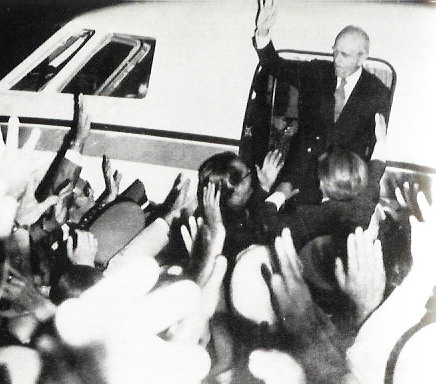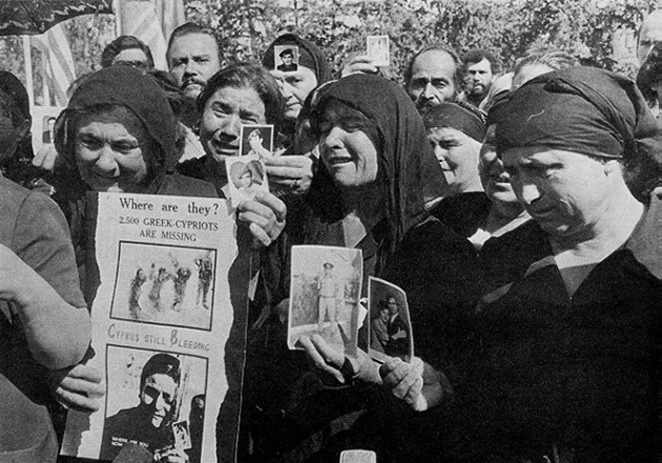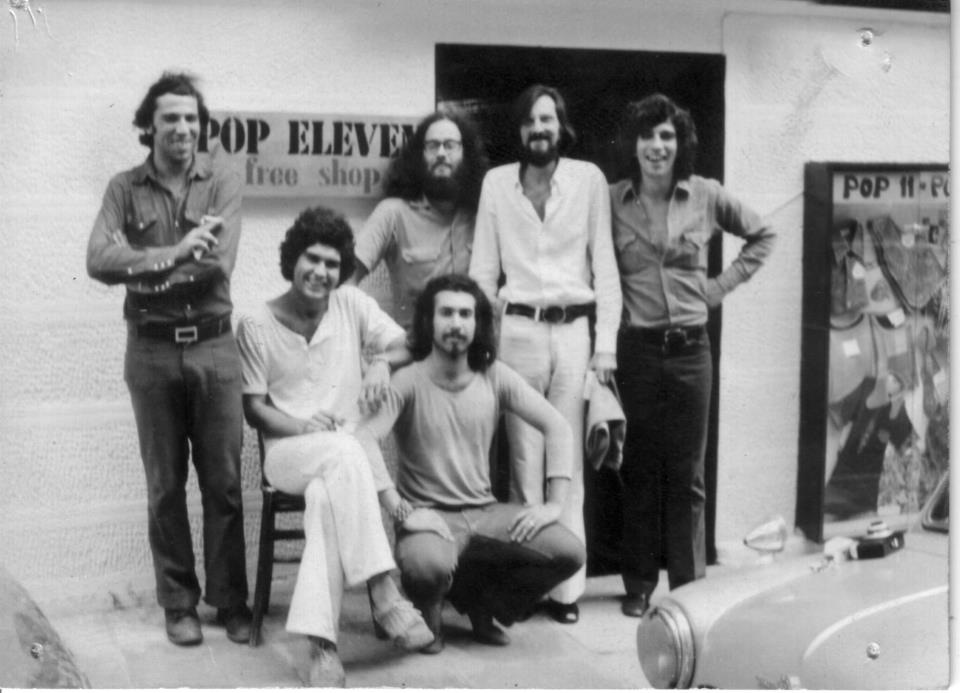 In the seventies the Junta's efforts to protect the Greek youth from the ills of western culture begins to fall apart. Because tourism is such an important part of the Greek economy, the bans on mini-skirts, long hair and other symbols of decadence are not enforced. As long haired westerners are heading overland to India some are bringing LSD from Europe. When some return they are carrying hashish from Turkey and Afghanistan. Two new record stores, Pop 11 and Blow-up are importing cool albums from the UK, and there are more underground radio stations than ever, almost all of them owned by young people and playing hard rock like Deep Purple, Jethro Tull, Black Sabbath, Free, and other British groups. The Greek islands have become a stopping point on the road between Europe and India. Places like Paradise Beach in Mykonos and Matala, Crete become hippy colonies, made up mostly of foreigners and a handful of adventurous young Greeks. The island of Ios is just starting to become known as a center for young people and sleeping on the beach if not actually legal, is common. There are cheap pensions and even in Athens you can sleep on the roof of a hotel for a few drachmas. It is these young people who flock to the islands for sun and sea and cheap prices despite the dictatorship, who return with their families decades later, turning Greece into one of the world's most popular tourist destinations. In the seventies the Junta's efforts to protect the Greek youth from the ills of western culture begins to fall apart. Because tourism is such an important part of the Greek economy, the bans on mini-skirts, long hair and other symbols of decadence are not enforced. As long haired westerners are heading overland to India some are bringing LSD from Europe. When some return they are carrying hashish from Turkey and Afghanistan. Two new record stores, Pop 11 and Blow-up are importing cool albums from the UK, and there are more underground radio stations than ever, almost all of them owned by young people and playing hard rock like Deep Purple, Jethro Tull, Black Sabbath, Free, and other British groups. The Greek islands have become a stopping point on the road between Europe and India. Places like Paradise Beach in Mykonos and Matala, Crete become hippy colonies, made up mostly of foreigners and a handful of adventurous young Greeks. The island of Ios is just starting to become known as a center for young people and sleeping on the beach if not actually legal, is common. There are cheap pensions and even in Athens you can sleep on the roof of a hotel for a few drachmas. It is these young people who flock to the islands for sun and sea and cheap prices despite the dictatorship, who return with their families decades later, turning Greece into one of the world's most popular tourist destinations. |
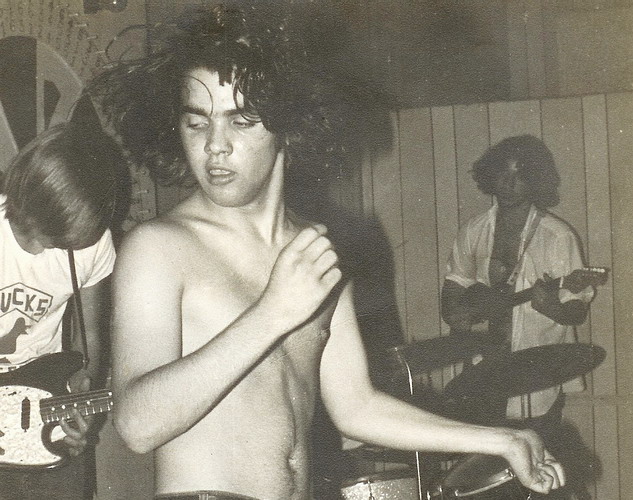 For the Greeks of high school and college age, drug use is uncommon. It is still the realm of the artists and musicians for the most part. But in the American community it is spreading among high school students and US airmen as well as the sailors from the 6th fleet now based in Faliron Bay. For these young people drugs can be bought easily and as foreigners, particularly as American foreigners, they live in a protective bubble. Unknown to the Junta Colonels and the American military, Embassy and CIA who are working to create a solid anti-communist capitalist society, their children are undermining them, turning their friends on to hashish and acid, listening to the MC5: Kick Out The Jams and passing around books like Jerry Rubin's Do-it, and Abbie Hoffman's Woodstock Nation. In the American high school the rock group CC Bluesking are introducing kids to their Iggy-on-drugs-inspired guitar and feedback oriented music, a sound truly ahead of its time. (Their bass-player, Yanni Vavoura goes on to become the Godfather of Greek punk years later.) While any kind of student protest is forbidden in the Greek schools, in 1971 a group of Greek-Americans at the American high school stage a protest and close down the school for a day making demands on the administration which are unrealistic to say the least, mostly having to do with being allowed to smoke on campus, non-mandatory class attendance, and the one demand which might be considered vaguely revolutionary, having free use of the school's mimeograph machine, though for what purpose we can only guess. The US military influenced school board responds by firing a favorite teacher, Jack Marlowe. When asked why the students did it they shrugged their shoulders and admitted they had read Abbie Hoffman's Revolution for the Hell of It and it seemed like a cool thing to do. Had this happened in one of the Greek high schools one can only wonder what the response would have been. For the Greeks of high school and college age, drug use is uncommon. It is still the realm of the artists and musicians for the most part. But in the American community it is spreading among high school students and US airmen as well as the sailors from the 6th fleet now based in Faliron Bay. For these young people drugs can be bought easily and as foreigners, particularly as American foreigners, they live in a protective bubble. Unknown to the Junta Colonels and the American military, Embassy and CIA who are working to create a solid anti-communist capitalist society, their children are undermining them, turning their friends on to hashish and acid, listening to the MC5: Kick Out The Jams and passing around books like Jerry Rubin's Do-it, and Abbie Hoffman's Woodstock Nation. In the American high school the rock group CC Bluesking are introducing kids to their Iggy-on-drugs-inspired guitar and feedback oriented music, a sound truly ahead of its time. (Their bass-player, Yanni Vavoura goes on to become the Godfather of Greek punk years later.) While any kind of student protest is forbidden in the Greek schools, in 1971 a group of Greek-Americans at the American high school stage a protest and close down the school for a day making demands on the administration which are unrealistic to say the least, mostly having to do with being allowed to smoke on campus, non-mandatory class attendance, and the one demand which might be considered vaguely revolutionary, having free use of the school's mimeograph machine, though for what purpose we can only guess. The US military influenced school board responds by firing a favorite teacher, Jack Marlowe. When asked why the students did it they shrugged their shoulders and admitted they had read Abbie Hoffman's Revolution for the Hell of It and it seemed like a cool thing to do. Had this happened in one of the Greek high schools one can only wonder what the response would have been. |
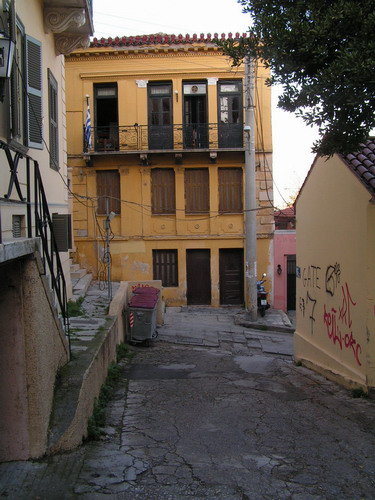 In the Plaka there are several hip clubs that have found a place among the restaurants, bouzoukia clubs and discos. One is The Odyssey, also known as 'the Trip' which plays contemporary danceable rock like Santana, _Led Zeppeli_n, and the endless Ina-gadda-davida by Iron Butterfly. Two blocks away, anchoring the corner of the Plaka that borders the ancient Athenian Agora are two other clubs. Folk 17 is a small Greenwich Village style live folk club where musicians, some who are just passing through on the way to the East or on their way home, perform _The Needle and the Damage Done o_r any of a number of Cat Stevens songs. The other club is the Golden Key, a tiny place which plays the hippest music in Athens and is notorious for being a hangout for drug users, meaning young people who smoke hashish or take LSD. The clubs make little money. Most people are already stoned when they get there and will sit all night with one drink. The street and steps between these two clubs is a gathering place for young Greeks and foreigners, kids from the American high school, airmen from the American base, sailors from the 6th fleet, and hippies from all over the world. Though the mood is generally happy and effusive, each night a police car makes its way up the small street and stops in front of the club and waits. The music stops as police officers go into the club and check identification, often leaving with two or three young Greeks, rarely foreigners. If you have an American passport, especially a diplomatic one, your eyes can be rolling around like loose marbles and they still leave you alone. After the police drive away the music begins and everyone wonders what the people arrested had done, what will happen to them and will they ever come back? Drug penalties are harsh. The concept of 'recreational use' does not exist. If you are busted unless you are very well connected you get 10 years or longer in prison. The idea of kids just partying is meaningless. When the Greek police arrest a handful of young people with a piece of hashish, in their view they have broken up a 'notorious gang of drug users'. This is what it was like to be young and hip under a military dictatorship. In the Plaka there are several hip clubs that have found a place among the restaurants, bouzoukia clubs and discos. One is The Odyssey, also known as 'the Trip' which plays contemporary danceable rock like Santana, _Led Zeppeli_n, and the endless Ina-gadda-davida by Iron Butterfly. Two blocks away, anchoring the corner of the Plaka that borders the ancient Athenian Agora are two other clubs. Folk 17 is a small Greenwich Village style live folk club where musicians, some who are just passing through on the way to the East or on their way home, perform _The Needle and the Damage Done o_r any of a number of Cat Stevens songs. The other club is the Golden Key, a tiny place which plays the hippest music in Athens and is notorious for being a hangout for drug users, meaning young people who smoke hashish or take LSD. The clubs make little money. Most people are already stoned when they get there and will sit all night with one drink. The street and steps between these two clubs is a gathering place for young Greeks and foreigners, kids from the American high school, airmen from the American base, sailors from the 6th fleet, and hippies from all over the world. Though the mood is generally happy and effusive, each night a police car makes its way up the small street and stops in front of the club and waits. The music stops as police officers go into the club and check identification, often leaving with two or three young Greeks, rarely foreigners. If you have an American passport, especially a diplomatic one, your eyes can be rolling around like loose marbles and they still leave you alone. After the police drive away the music begins and everyone wonders what the people arrested had done, what will happen to them and will they ever come back? Drug penalties are harsh. The concept of 'recreational use' does not exist. If you are busted unless you are very well connected you get 10 years or longer in prison. The idea of kids just partying is meaningless. When the Greek police arrest a handful of young people with a piece of hashish, in their view they have broken up a 'notorious gang of drug users'. This is what it was like to be young and hip under a military dictatorship. |
 For the Greeks of high school and college age, drug use is uncommon. It is still the realm of the artists and musicians for the most part. But in the American community it is spreading among high school students and US airmen as well as the sailors from the 6th fleet now based in Faliron Bay. For these young people drugs can be bought easily and as foreigners, particularly as American foreigners, they live in a protective bubble. Unknown to the Junta Colonels and the American military, Embassy and CIA who are working to create a solid anti-communist capitalist society, their children are undermining them, turning their friends on to hashish and acid, listening to the MC5: Kick Out The Jams and passing around books like Jerry Rubin's Do-it, and Abbie Hoffman's Woodstock Nation. In the American high school the rock group CC Bluesking are introducing kids to their Iggy-on-drugs-inspired guitar and feedback oriented music, a sound truly ahead of its time. (Their bass-player, Yanni Vavoura goes on to become the Godfather of Greek punk years later.) While any kind of student protest is forbidden in the Greek schools, in 1971 a group of Greek-Americans at the American high school stage a protest and close down the school for a day making demands on the administration which are unrealistic to say the least, mostly having to do with being allowed to smoke on campus, non-mandatory class attendance, and the one demand which might be considered vaguely revolutionary, having free use of the school's mimeograph machine, though for what purpose we can only guess. The US military influenced school board responds by firing a favorite teacher, Jack Marlowe. When asked why the students did it they shrugged their shoulders and admitted they had read Abbie Hoffman's Revolution for the Hell of It and it seemed like a cool thing to do. Had this happened in one of the Greek high schools one can only wonder what the response would have been.
For the Greeks of high school and college age, drug use is uncommon. It is still the realm of the artists and musicians for the most part. But in the American community it is spreading among high school students and US airmen as well as the sailors from the 6th fleet now based in Faliron Bay. For these young people drugs can be bought easily and as foreigners, particularly as American foreigners, they live in a protective bubble. Unknown to the Junta Colonels and the American military, Embassy and CIA who are working to create a solid anti-communist capitalist society, their children are undermining them, turning their friends on to hashish and acid, listening to the MC5: Kick Out The Jams and passing around books like Jerry Rubin's Do-it, and Abbie Hoffman's Woodstock Nation. In the American high school the rock group CC Bluesking are introducing kids to their Iggy-on-drugs-inspired guitar and feedback oriented music, a sound truly ahead of its time. (Their bass-player, Yanni Vavoura goes on to become the Godfather of Greek punk years later.) While any kind of student protest is forbidden in the Greek schools, in 1971 a group of Greek-Americans at the American high school stage a protest and close down the school for a day making demands on the administration which are unrealistic to say the least, mostly having to do with being allowed to smoke on campus, non-mandatory class attendance, and the one demand which might be considered vaguely revolutionary, having free use of the school's mimeograph machine, though for what purpose we can only guess. The US military influenced school board responds by firing a favorite teacher, Jack Marlowe. When asked why the students did it they shrugged their shoulders and admitted they had read Abbie Hoffman's Revolution for the Hell of It and it seemed like a cool thing to do. Had this happened in one of the Greek high schools one can only wonder what the response would have been. In the Plaka there are several hip clubs that have found a place among the restaurants, bouzoukia clubs and discos. One is The Odyssey, also known as 'the Trip' which plays contemporary danceable rock like Santana, _Led Zeppeli_n, and the endless Ina-gadda-davida by Iron Butterfly. Two blocks away, anchoring the corner of the Plaka that borders the ancient Athenian Agora are two other clubs. Folk 17 is a small Greenwich Village style live folk club where musicians, some who are just passing through on the way to the East or on their way home, perform _The Needle and the Damage Done o_r any of a number of Cat Stevens songs. The other club is the Golden Key, a tiny place which plays the hippest music in Athens and is notorious for being a hangout for drug users, meaning young people who smoke hashish or take LSD. The clubs make little money. Most people are already stoned when they get there and will sit all night with one drink. The street and steps between these two clubs is a gathering place for young Greeks and foreigners, kids from the American high school, airmen from the American base, sailors from the 6th fleet, and hippies from all over the world. Though the mood is generally happy and effusive, each night a police car makes its way up the small street and stops in front of the club and waits. The music stops as police officers go into the club and check identification, often leaving with two or three young Greeks, rarely foreigners. If you have an American passport, especially a diplomatic one, your eyes can be rolling around like loose marbles and they still leave you alone. After the police drive away the music begins and everyone wonders what the people arrested had done, what will happen to them and will they ever come back? Drug penalties are harsh. The concept of 'recreational use' does not exist. If you are busted unless you are very well connected you get 10 years or longer in prison. The idea of kids just partying is meaningless. When the Greek police arrest a handful of young people with a piece of hashish, in their view they have broken up a 'notorious gang of drug users'. This is what it was like to be young and hip under a military dictatorship.
In the Plaka there are several hip clubs that have found a place among the restaurants, bouzoukia clubs and discos. One is The Odyssey, also known as 'the Trip' which plays contemporary danceable rock like Santana, _Led Zeppeli_n, and the endless Ina-gadda-davida by Iron Butterfly. Two blocks away, anchoring the corner of the Plaka that borders the ancient Athenian Agora are two other clubs. Folk 17 is a small Greenwich Village style live folk club where musicians, some who are just passing through on the way to the East or on their way home, perform _The Needle and the Damage Done o_r any of a number of Cat Stevens songs. The other club is the Golden Key, a tiny place which plays the hippest music in Athens and is notorious for being a hangout for drug users, meaning young people who smoke hashish or take LSD. The clubs make little money. Most people are already stoned when they get there and will sit all night with one drink. The street and steps between these two clubs is a gathering place for young Greeks and foreigners, kids from the American high school, airmen from the American base, sailors from the 6th fleet, and hippies from all over the world. Though the mood is generally happy and effusive, each night a police car makes its way up the small street and stops in front of the club and waits. The music stops as police officers go into the club and check identification, often leaving with two or three young Greeks, rarely foreigners. If you have an American passport, especially a diplomatic one, your eyes can be rolling around like loose marbles and they still leave you alone. After the police drive away the music begins and everyone wonders what the people arrested had done, what will happen to them and will they ever come back? Drug penalties are harsh. The concept of 'recreational use' does not exist. If you are busted unless you are very well connected you get 10 years or longer in prison. The idea of kids just partying is meaningless. When the Greek police arrest a handful of young people with a piece of hashish, in their view they have broken up a 'notorious gang of drug users'. This is what it was like to be young and hip under a military dictatorship.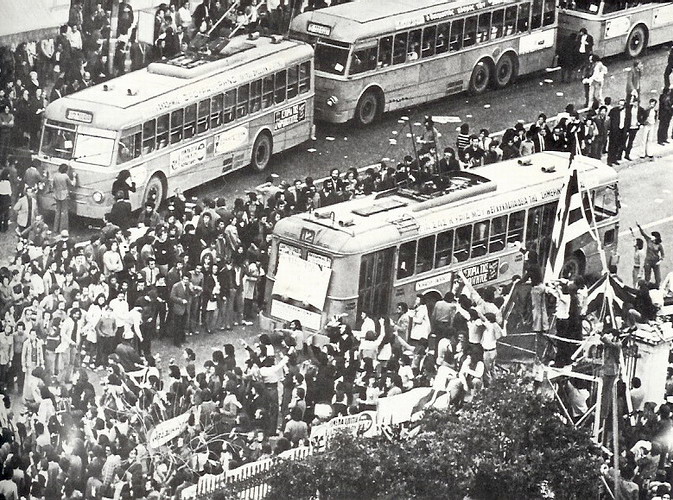 On November 14th of 1973 students begin gathering at the Athens Polytechnic to demonstrate against the Junta. This demonstration which is coordinated with occupations of campuses in Patras and Thessaloniki, turns into a student rebellion that gathers strength every day as more and more people join, some students but many working class and the well-educated. On the 16th the students and fellow demonstrators attempt to march from the Polytechnic to Syntagma square but they are halted by the police. As more people gather at the Polytechnic, already there are plans for ending the student rebellion, using tanks from the nearby bases in and around Athens. The students are preparing for a siege, collecting food and medical supplies, building barricades and broadcasting on a clandestine radio station that the time is right to overthrow the junta and calling for their countrymen to join them in central Athens. Anti-Junta and anti-American graffiti is painted on buildings and passing buses which spread their message throughout the city.
On November 14th of 1973 students begin gathering at the Athens Polytechnic to demonstrate against the Junta. This demonstration which is coordinated with occupations of campuses in Patras and Thessaloniki, turns into a student rebellion that gathers strength every day as more and more people join, some students but many working class and the well-educated. On the 16th the students and fellow demonstrators attempt to march from the Polytechnic to Syntagma square but they are halted by the police. As more people gather at the Polytechnic, already there are plans for ending the student rebellion, using tanks from the nearby bases in and around Athens. The students are preparing for a siege, collecting food and medical supplies, building barricades and broadcasting on a clandestine radio station that the time is right to overthrow the junta and calling for their countrymen to join them in central Athens. Anti-Junta and anti-American graffiti is painted on buildings and passing buses which spread their message throughout the city.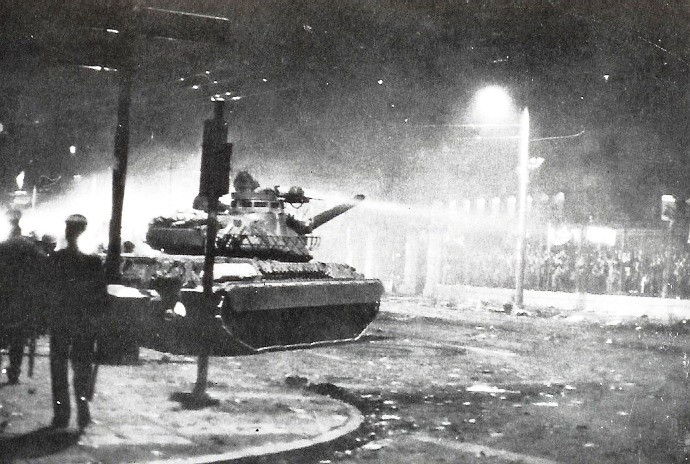 At 2am on November 17th the tanks Papadopoulos has ordered to crush the student rebellion arrive at the Polytechnic. At 2:15 a group of students come out to negotiate a surrender asking for half an hour to evacuate the campus. The officers in charge will only give them fifteen minutes but don't even wait for ten. At 3am a tank crashes through the gate of the polytechnic and police and military storm the campus. As the gate crashes to the ground students rush out to escape and are beaten with clubs and arrested. At least 34 demonstrators are killed though there are rumors that the number is much higher. Several hundred are injured and almost a thousand are arrested at the school and at the Ministry of Public Order which had been under siege by demonstrators. Oddly most of the wounded have been admitted into the hospitals with bullet wounds before the army ever got to the school. Of the police and the army the injuries are few and relatively minor, none with bullet wounds. On the other hand the police had fired some 24,000 rounds. Though police claimed the demonstrators had destroyed Ministry and University property damage to buildings in both locations is minor. Read Newspaper Account
At 2am on November 17th the tanks Papadopoulos has ordered to crush the student rebellion arrive at the Polytechnic. At 2:15 a group of students come out to negotiate a surrender asking for half an hour to evacuate the campus. The officers in charge will only give them fifteen minutes but don't even wait for ten. At 3am a tank crashes through the gate of the polytechnic and police and military storm the campus. As the gate crashes to the ground students rush out to escape and are beaten with clubs and arrested. At least 34 demonstrators are killed though there are rumors that the number is much higher. Several hundred are injured and almost a thousand are arrested at the school and at the Ministry of Public Order which had been under siege by demonstrators. Oddly most of the wounded have been admitted into the hospitals with bullet wounds before the army ever got to the school. Of the police and the army the injuries are few and relatively minor, none with bullet wounds. On the other hand the police had fired some 24,000 rounds. Though police claimed the demonstrators had destroyed Ministry and University property damage to buildings in both locations is minor. Read Newspaper Account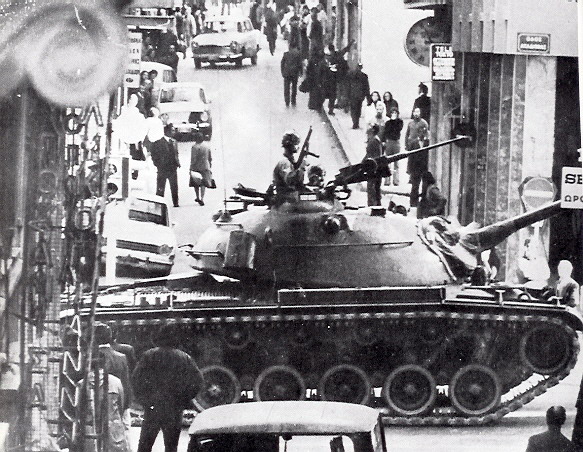 For the next two days crowds attempting to gather in central Athens are broken up by police and soldiers who are everywhere. Tanks are parked in squares around the city and surround the Parliament building. The rebellion at the Polytechnic is over and the country is put under martial law for the next week. Groups larger than four people are not permitted to gather and there is a curfew between 7pm and 5am. Former politicians George Mavros, Panayiotis Kannelopoulos and Ioannis Zigdis and a number of professors are arrested. There are still small demonstrations around the city and a number of people are shot during this week, some for breaking the curfew. In my neighborhood of Agia Paraskevis there was a tank on the corner that I had to sneak past to visit my friend Gael Murphy. My friend Harry kept me informed by phone on what was going on in Syntagma Square, where he lived. I recorded our conversation and typed it out and handed it in for my drama class in college and got an A. (Gael became one of the founders of Code Pink.)
For the next two days crowds attempting to gather in central Athens are broken up by police and soldiers who are everywhere. Tanks are parked in squares around the city and surround the Parliament building. The rebellion at the Polytechnic is over and the country is put under martial law for the next week. Groups larger than four people are not permitted to gather and there is a curfew between 7pm and 5am. Former politicians George Mavros, Panayiotis Kannelopoulos and Ioannis Zigdis and a number of professors are arrested. There are still small demonstrations around the city and a number of people are shot during this week, some for breaking the curfew. In my neighborhood of Agia Paraskevis there was a tank on the corner that I had to sneak past to visit my friend Gael Murphy. My friend Harry kept me informed by phone on what was going on in Syntagma Square, where he lived. I recorded our conversation and typed it out and handed it in for my drama class in college and got an A. (Gael became one of the founders of Code Pink.)
